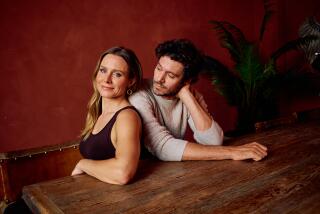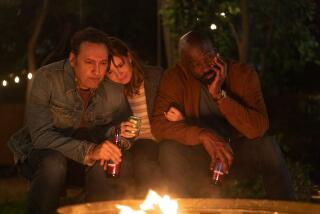Unmarried to the mob
New York — LAST Christmas, as Mark V. Olsen screened a new episode of “Big Love,” the HBO drama about a suburban polygamous family that he created and produces with his partner Will Scheffer, he found himself deeply unsettled.
The actions taken by the Henrickson family to protect their way of life -- measures that seemed so palatable in the script -- had a different veneer when Olsen viewed them onscreen.
“I couldn’t tell what I was watching,” he recounted. “Is it a cult at work? Or is this a loving, valid family? It was very disturbing to me. But at the end of the day, I kind of like walking that line and letting the audience make up their own minds.”
The fact that “Big Love” keeps even its creators guessing about its true intent speaks to the subtle workings of the series, which returns for its second season Monday.
The show hinges on the relationship between Bill Henrickson (Bill Paxton) and his three wives -- levelheaded Barb (Jeanne Tripplehorn), wily Nicki (Chloe Sevigny) and impulsive Margene (Ginnifer Goodwin) -- whose arrangement is at once startling unorthodox and staunchly traditional. The founder of a home improvement store chain, Bill frets about keeping his business afloat and supporting his seven children, who live in three adjacent homes with a shared backyard in a Utah suburb. The fact that he and his wives are secret polygamists is the titillating hook of the show and the engine of its narrative, yet also the window into the examination of far more universal experiences.
After laying out the architecture of relationships in the first season -- particularly the enmity between Bill and Roman Grant, Nicki’s father and the dictatorial leader of a fundamentalist polygamous sect -- “Big Love” delves deeper this summer into the nature of polygamy and, by extension, the concepts of marriage, family and faith.
To Paxton, the series reflects a widespread preoccupation with the influence of modern life on the family structure.
“Americans don’t have family like we used to,” he said. “There’s a subconscious longing in our psyche as a people for that extended family that is there to catch you if you fall and to support you in your triumphs. I think Mark and Will have found a really clever lens to refract all kinds of ideas and contemporary mores about marriage and family. I think we could become, oddly enough, kind of the first family of television.”
To achieve that, the show will have to overcome what Olsen and Scheffer call the instinctive “yuck” response to a series about polygamy. They feel they’re off to a good start: In its first season, “Big Love” drew an average of 4.1 million viewers for its runs on Sunday nights, an audience second only to HBO’s “The Sopranos.” This season, though, the drama is losing its “Sopranos” lead-in and moving to Mondays, a switch that leaves it “out on a limb,” Scheffer said. Yet the producers remain optimistic.
“We’ve found strange bedfellows,” he added. “We hear people talking about their conservative Christian friends liking it because it’s a family values show. It’s not cynical. It’s not glib.”
There’s also less push-back this time around from the Mormon Church, which balked at the show’s premise, fearing it would reinforce the misconception that the church still endorses polygamy. The complaints prompted HBO executives to carefully scrutinize the program’s depiction of Mormons.
“But this year, they kind of let us be,” Scheffer said. “I think we proved ourselves, so they let us dramatize whatever we wanted to without too much gatekeeping. It took some of the creative shackles off us, to tell you the truth, and just allowed us to write the characters as the characters, without a couple little angels on either shoulder going, ‘Will this alienate viewers? Will it be too polygamous?’ ”
The show’s creators, who are both personal and writing partners, said the initial aversion they both felt toward polygamy has softened as they’ve worked on the show. “When I started the series, polygamy was beyond the pale,” Olsen said. “When we would hear women advocate polygamy and talk about how good their marriages were, I would say, ‘Stockholm syndrome. You’re brainwashed.’ I don’t necessarily feel that anymore. I certainly see abuses to it. But nevertheless, in its best-case scenario, I see it being a valid lifestyle.”
“Big Love” manages to be simultaneously empathetic and skeptical in its portrayal of polygamy. That duality is reflected this season in Bill’s two eldest children, Sarah and Ben, who each wrestle with their feelings about their parents’ marriage, with differing results.
At the same time, the show’s writers sought to add more moral complexity to the character of Bill, who some critics complained was too opaque. In new episodes, he schemes to buy a video poker company that Roman wants. “He’s now not such a Job character with everything being heaped upon him,” Paxton said. “He goes on the offensive.”
In a turning point midway through the season, Bill contemplates taking on a fourth wife, a waitress from Serbia he meets at local diner. As they flirt, he struggles with the question of “whether this is lust or a celestial calling,” Olsen said.
His dilemma is one that many will relate to, the writers believe.
“It seems like so many people go through that in their lives with affairs or whatever they’re doing, where they’re asking themselves, ‘Is this real love, or is this just sex?’ ” Scheffer said. “That was one of the intriguing questions we asked ourselves when we were creating this series, and it’s sort of a question that doesn’t go away.”
More to Read
The complete guide to home viewing
Get Screen Gab for everything about the TV shows and streaming movies everyone’s talking about.
You may occasionally receive promotional content from the Los Angeles Times.






